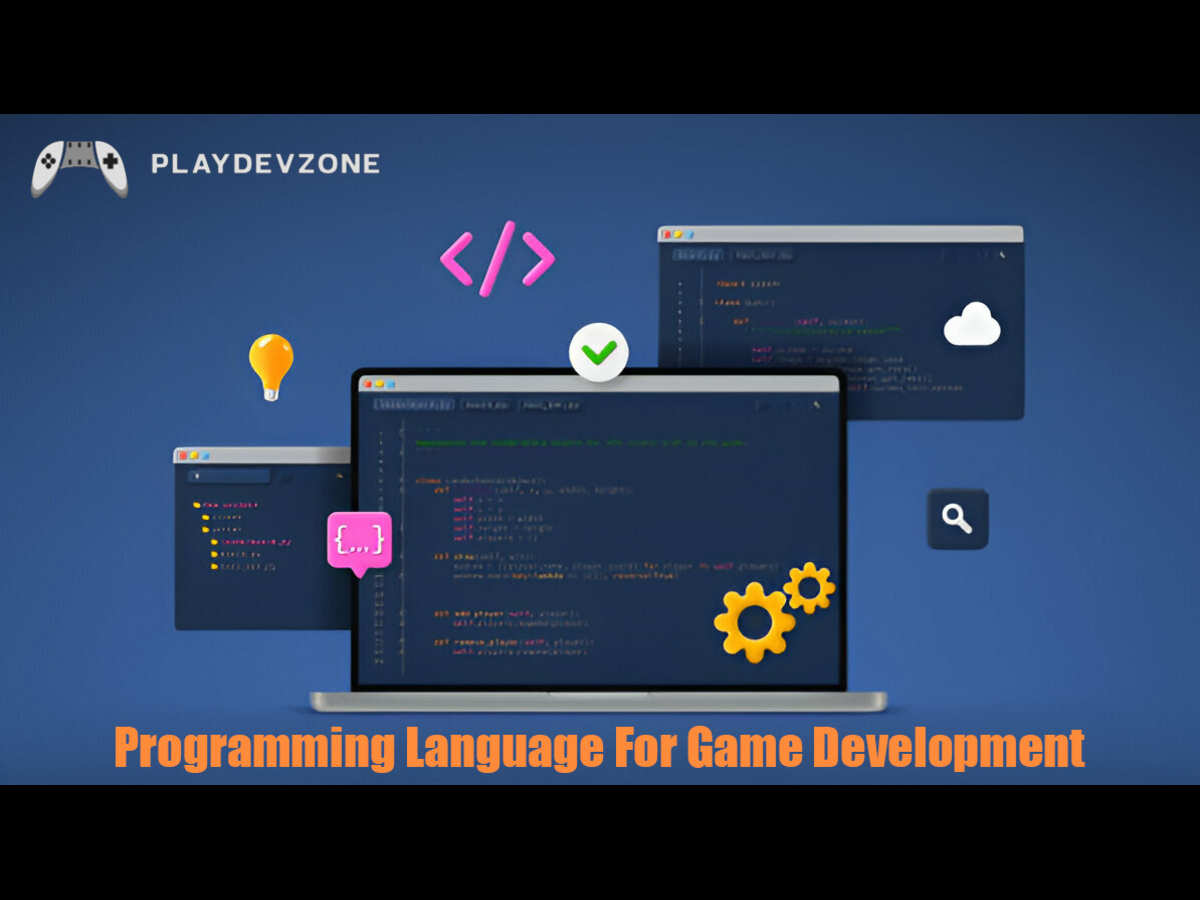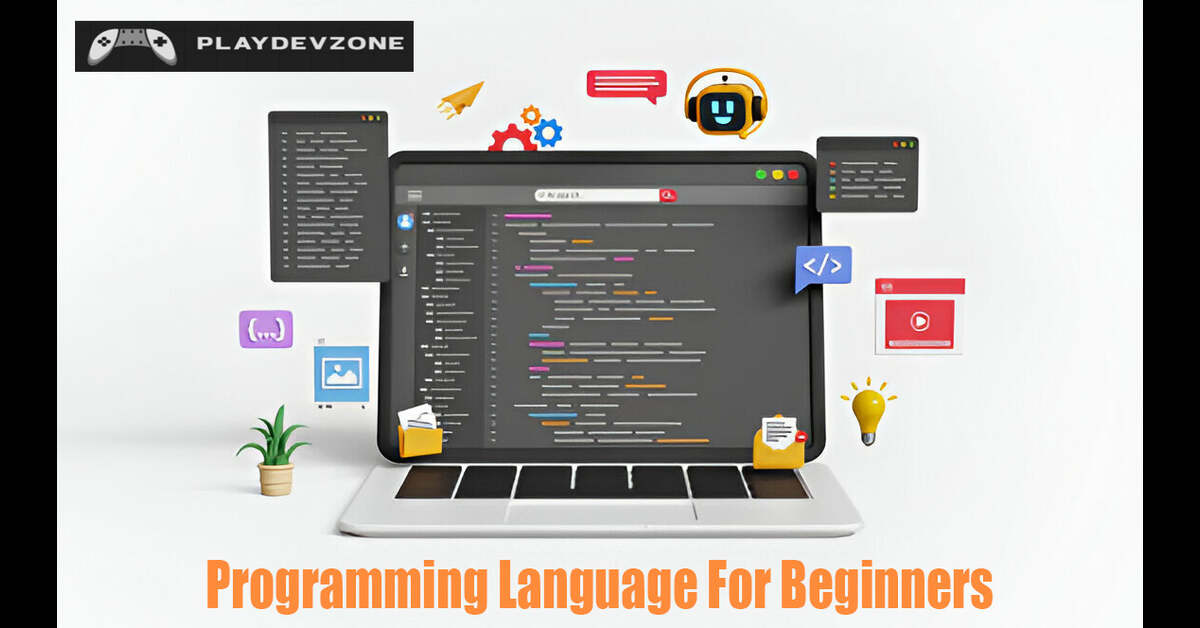Introduction
Are you dreaming of building your own video game but unsure which programming language to start with?
Choosing the best programming language for beginners' game development can be overwhelming, especially with numerous options available, including C++, C#, Python, and JavaScript (Best Programming Language For Beginners).
The truth is that the "right" language depends on your goals, the type of game you want to create, and the game engine you plan to use (such as Unity or Unreal Engine).
Whether you're a total beginner or looking to level up your skills, this guide will help you make an informed decision.
In this article, we'll break down the top programming languages used in game development, their pros and cons, and which ones are best for beginners, mobile games, indie projects, or large-scale 3D games.

What Makes a Programming Language Great for Game Development?
Choosing the right programming language is vital to achieving success in game development.
The ideal language delivers exceptional performance, particularly when handling complex graphics and real-time gameplay elements.
It should be compatible with popular game engines, such as Unity, Unreal, or Godot.
Equally important is community support. A large, active developer base means more tutorials, forums, and troubleshooting help.
Beginners also benefit from a simple, readable syntax, making the learning curve smoother.
Cross-platform support is another key factor, enabling games to run on multiple platforms, including PC, mobile devices, and consoles (Best Programming Language For Beginners).
Whether you're building a 2D indie game or a 3D action title, the best language is the one that aligns with your project goals and development tools.
Top Programming Languages for Game Development
Game development is a rapidly growing field, and selecting the correct programming language is a crucial step in building a successful game.
Several languages stand out for their performance, flexibility, and compatibility with major game engines.
C++ remains a dominant language in the gaming industry, especially for developing AAA titles and demanding 3D graphics applications.
It serves as the foundation for powerful game engines such as Unreal Engine, providing developers with precise control over memory management and system resources for optimal performance (Best Programming Language For Beginners).
C# is the preferred language for Unity, one of the most popular engines for indie, mobile, and AR/VR games, thanks to its simplicity and extensive documentation.
Python is great for beginners and rapid prototyping, though it's not ideal for high-performance games (Best Programming Language For Beginners).
JavaScript, often paired with HTML5, is perfect for browser-based or lightweight mobile games.
Meanwhile, Java remains a significant player in Android game development, offering robust object-oriented features.
Each language serves different needs, so the best one depends on your project type, platform, and experience level.
Which Language Should You Choose?
The best programming language for game development varies based on your specific goals, target platform, and level of coding experience.
If you're a beginner, C# is a great choice, especially for working with Unity, which is beginner-friendly and supports 2D, 3D, and mobile games.
If you're aiming for high-performance 3D games or want to work with Unreal Engine, then C++ is ideal, though it requires more technical skill.
Python is perfect for learning the basics and building small prototypes quickly, while JavaScript is best for browser-based games (Best Programming Language For Beginners).
For Android game development, Java is still widely used and well-supported.
Begin with a language that suits your project and learning style, then expand as your skills develop.
Learning Resources for Each Language
Finding the right learning resources is crucial when embarking on your game development journey.
For C#, platforms such as Microsoft Learn, Unity Learn, and Udemy offer structured tutorials that are perfect for beginners.
Those learning C++ can enhance their skills through platforms like Codecademy and Pluralsight, as well as by studying the official Unreal Engine documentation for hands-on guidance.
If you’re learning Python, websites like freeCodeCamp, W3Schools, and Coursera provide beginner-friendly lessons.
JavaScript developers can explore MDN Web Docs and JavaScript.info, particularly for browser-based games (Best Programming Language For Beginners).
For Java, consider Java Programming by edX or SoloLearn, especially for Android game development.
Most of these platforms offer both free and paid courses, allowing you to start at your own pace.
Selecting high-quality resources tailored to your chosen language will accelerate your learning and enhance your game development skills.
FAQ (Frequently Asked Questions)
What is the easiest language for game development?
C# is often regarded as one of the most beginner-friendly languages for game development, making it an excellent choice for those just starting out.
It has a simple syntax and strong community support and is the primary language used with Unity, one of the most popular and beginner-friendly game engines.
C# allows you to build 2D, 3D, mobile, and desktop games with ease.
Another beginner-friendly option is Python, known for its readability and ease of use (Best Programming Language For Beginners).
While Python isn’t ideal for high-performance games, it’s great for learning the basics and creating simple prototypes.
If you’re interested in browser games, JavaScript is also easy to learn and works well with HTML5.
Which language is used in Unity/Unreal Engine?
Unity primarily uses C# as its scripting language.
It’s known for its clean syntax, ease of learning, and strong community support, making it an ideal choice for both beginners and professionals.
C# is used to write game logic, control gameplay elements, and interact with Unity’s powerful engine features (Best Programming Language For Beginners).
On the other hand, Unreal Engine uses C++ for advanced programming and Blueprint, a visual scripting system designed for non-programmers.
C++ provides high performance, which is crucial for complex 3D and AAA games.
Which coding language is best for game development?
The best coding language for game development depends on your goals and the type of games you want to build.
C# is widely regarded as the best choice for beginners and indie developers, particularly when using Unity, due to its simplicity and versatility (Best Programming Language For Beginners).
If you're targeting high-performance 3D or AAA games, C++ is the top choice among professionals in engines like Unreal Engine due to its speed and control.
For browser games, JavaScript with HTML5 is highly effective, while Python is perfect for learning game development basics and prototyping.
Ultimately, the best language is one that fits your project requirements, game engine preference, and learning curve. Start with C# for ease, or choose C++ if performance and flexibility are your top priorities.
Can I make games without coding?
Yes, you can make games without coding by using no-code or low-code game development tools.
Platforms like Unity (using Bolt/Visual Scripting), Unreal Engine’s Blueprint system, GDevelop, GameMaker Studio, and Construct 3 allow you to build games using visual interfaces instead of traditional programming.
These tools are ideal for beginners who want to create 2D or simple 3D games without needing to learn complex code (Best Programming Language For Beginners).
You can design levels, set game logic, and manage interactions through drag-and-drop systems.
While advanced features may eventually require coding, no-code tools are more than enough for creating prototypes, indie games, or even publishing to platforms like Android, iOS, or the web.
Does Unity use C++?
Unity primarily uses C# as its scripting language for game development, not C++.
However, the Unity engine itself is mainly built in C++ behind the scenes to ensure high performance and efficiency.
As a developer, you write your game scripts and logic in C# to interact with Unity’s tools and features.
This approach enables Unity to leverage the power of C++ in the engine core while also benefiting from the ease of use and flexibility of C# for scripting (Best Programming Language For Beginners).
So, while you won’t need to code in C++ when developing games in Unity, understanding that the engine runs on C++ helps explain its speed and capabilities.
For most game projects, focusing on learning C# is the best path to mastering Unity.
Is Python or Java better for game development?
Choosing between Python and Java for game development depends on your project goals.
Python is beginner-friendly, with simple syntax and numerous libraries, such as Pygame, that make it ideal for learning the basics of game development and creating small to medium-sized 2D games.
However, it’s not optimized for high-performance or complex 3D games.
On the other hand, Java is more versatile, widely used in Android game development, and supports robust object-oriented programming (Best Programming Language For Beginners).
Java offers better performance for mobile and cross-platform games compared to Python.
If you’re starting and want quick results with simple games, Python is a great choice.
For building scalable, mobile-friendly games, Java is generally better suited.
Conclusion
Choosing the best programming language for game development depends on your experience level, project goals, and target platform.
For beginners and indie developers, C# with Unity offers an accessible and powerful way to start creating games.
If you aim to build high-performance, AAA-quality games, C++ with Unreal Engine is the industry standard (Best Programming Language For Beginners).
Languages like Python and JavaScript are excellent for prototyping, simple games, and web-based projects.
Keep in mind, the best programming language is the one that aligns with your personal goals and learning preferences. Choose a language that sparks your interest, and don’t be afraid to explore and experiment as you grow.
With dedication and the right tools, your game development journey can turn your ideas into amazing playable experiences.

